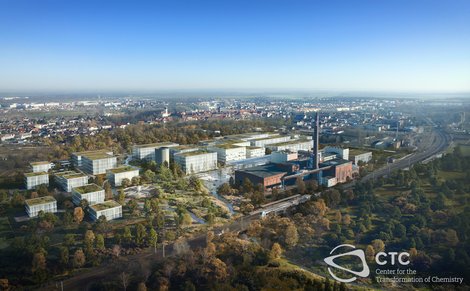Circular economy in the chemical industry: University of Halle involved in a new large-scale research center

Over the next few years, a new research facility, the Center for the Transformation of Chemistry (CTC), will be built in the former coal-mining region of central Germany. The plan for the center was announced by the Federal Minister of Education and Research Bettina Stark-Watzinger, together with the Minister Presidents Dr. Reiner Haseloff and Michael Kretschmer. The center will play a decisive role in defining the structural transformation of central Germany following the phase-out of coal and will also open up new prospects for the region. The proposal for the new research facility was drawn up under the guidance of Professor Peter Seeberger from the Max Planck Institute of Colloids and Interfaces in Potsdam. The plan is for the center to receive funding of up to 170 million euros per year. Martin Luther University Halle-Wittenberg (MLU) is also involved in the project, together with the University of Leipzig.
"The creation of a new large-scale research facility in the former coal-mining area is a major success and will give an important boost to the region. The phase-out of coal and the accompanying move away from fossil raw materials present significant challenges, but also offer huge potential for innovative value chains. The MLU is happy to make its expertise available to the new center," said the Rector, Professor Claudia Becker.
The CTC will address one of the most urgent challenges of the 21st century and, at the same time, establish and develop a location for world-class research that will attract skilled employees and partner organizations from the worlds of science and business. In addition, it will offer considerable potential for new businesses and provide long-term support for the structural transformation of the former coal-mining area of central Germany. The research center will build on the long history of the Chemical Triangle Halle-Merseburg-Bitterfeld and incorporate the value chains and the applied and demand-based research approaches that are highly important for the energy, mobility, food, healthcare and agriculture industries, together with mechanical engineering and plant construction.
The CTC will strengthen the entire area that is undergoing structural change and offer new and lasting development prospects. The establishment of the CTC with its research and innovation capabilities, most importantly with regard to digitalization and AI, is intended to promote corresponding research and development activities within industry and encourage spin-offs and the arrival of new companies that will safeguard the future of the location. The area will become an attractive workplace at the interface between technology and manufacturing that will act as a magnet for young people with a high standard of education and will counteract the fall in the number of people of working age in the region.
The MLU and the University of Leipzig will contribute the expertise of their many researchers to the CTC, alongside the concept of an independent research, teaching and organizational unit that will act as an institutional bridge to the research center. The joint structure will encourage cross-disciplinary basic and applied research and career development and also promote studying, teaching and academic education. The shared concept involving both universities is intended to create new economic prospects for the people and towns in the former coal-mining region of central Germany following the phase-out of brown coal.
Alongside the CTC, the German Center for Astrophysics is another research center that will receive funding to help manage the structural transformation in the coal-mining areas of Lausitz in Saxony and the former central German coalfield. A total of six concepts were submitted for the two research centers. Both initiatives were successful winners of the ideas competition "Knowledge creates prospects for the region!" which had 100 entries.

